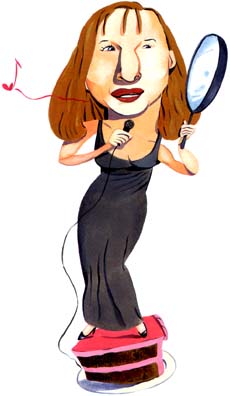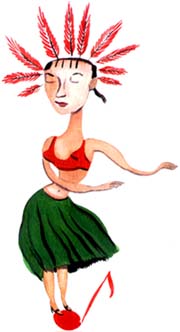The Worst Songwriter of All Time
From "(How Much Is) That Doggie in the Window?" to Barbra Streisand's "People."

Bob Merrill wrote one of the most recognizable, most parodied, and (for non-Streisand fans) most irritating lyrics of all time:
People
People who need people
Are the luckiest people in the world.
I don't know whether Merrill was a person who needed people and, if he did, whether he considered himself lucky for so doing. But the other week he went out to the driveway of his Los Angeles home and shot himself. He was 76. When the elderly kill themselves, we gloss over that fact: It isn't really a tragedy, not like a teen-ager's suicide, or a young mother's. But, for the record, aside from self-destructing rockers such as Kurt Cobain, I can't think of another hit songwriter who's taken his life. I only had a very slight acquaintance with Merrill, but it seems a sad end for someone who wrote more determinedly happy songs than anyone in history.
In a century of pop music, Bob Merrill pretty much has a hammerlock on the first half of the 1950s. Even then, he wasn't exactly a household name--and, if you beg to differ, chances are your household's mixing him up with Robert Merrill, the great Metropolitan Opera baritone who appeared around the same time. Merrill (Bob) chose the diminutive deliberately to avoid confusion with Merrill (Robert), though it's hard to see why anyone would think a fellow who makes his living singing Mozart and Verdi would go home at night and write "If I Knew You Were Comin', I'd've Baked a Cake." That was Bob's first hit. He'd been head writer at NBC and dialogue director at Columbia Pictures, but when he tried to break into Tin Pan Alley, they kept telling him his stuff was too complex. He took their advice to heart--and how:
If I knew you were comin', I'd've baked a cake
Baked a cake
Baked a cake
If I knew you were comin', I'd've baked a cake
Howdja do?
Howdja do?
Howdja do?
Not exactly Lorenz Hart. But it sold a million. And Merrill followed it with an even bigger song, "(How Much Is) That Doggie in the Window?" a hit for Patti Page--or, to give her her formal title, "The Singing Rage Miss Patti Page." Posterity hasn't been that kind to Patti and her four-legged friend. "It would be unfair to call this a nursery rhyme; it was childish rather than childlike," writes Donald Clarke in The Rise and Fall of Popular Music. "Nobody knows how many music fans stopped listening to the radio after hearing 'Doggie In The Window' too many times." Clarke's being a little harsh. The early '50s, don't forget, were the heyday of the dog song, and rare was the pop star who managed to avoid having one inflicted on him: Half a century later, Frank Sinatra will sock you on the jaw if you so much as mention "Mama Will Bark," his canine love duet with the big-breasted faux-Scandinavian "actress" Dagmar. The Singing Dogs, who barked their way through "Oh, Susanna," are more relaxed about it, but then, of course, they are dogs. By these standards, Merrill's song was, as they say at Westminster Kennel Club, Best in Show.

Novelty songs, they used to call them. But, in the early '50s, novelties weren't so much a novelty as terrifyingly ubiquitous. If you want the entire history of pop music on one single--the tug between its highest aspirations and its basest instincts--Sinatra wrapped it up in 1951: on the B side, "I'm a Fool to Want You," an almost painfully exposed ballad that today ranks as one of his greatest recordings; but, on the A side ... yes, "Mama Will Bark." Mitch Miller, top dog at Columbia Records, insisted Sinatra do it. Frank wound up leaving Columbia, but he never forgave Miller. Years later, they happened to be crossing a Vegas lobby from opposite ends. Miller extended his hand in friendship; Sinatra snarled, "Fuck you! Keep walking!"
But so what? In those days, Sinatra was a loser. The smart money was on Miller's new discovery, Guy Mitchell--nice kid, pleasant voice, no trouble. Frank didn't want "Sparrow in the Treetop," so Miller gave it to Mitchell, along with "My Truly, Truly Fair," "Belle, Belle, My Liberty Belle," "Feet Up (Pat Him on the Po-Po)," "She Wears Red Feathers (And a Hula-Hula Skirt)" and "There's a Pawnshop on the Corner in Pittsburgh, Pennsylvania"--the biggest hit ever written about Pittsburgh.
All six songs were by Bob Merrill, all were arranged with Miller's unrelenting jolliness (whooping French horns throughout), and all were smashes. If Merrill had a yen to write boy-meets-girl, it didn't show: boy-meets-cake, girl-meets-dog, sparrow-meets-treetop ... Pop songs are supposed to be universal--"I Will Always Love You"--but Merrill was specific with a vengeance: Even if you were minded to write a song about a gal who wears red feathers and a huley-huley skirt and lives on jes' cokeynuts, why would you open with the line "I work in a London bank"? It remains, incidentally, the biggest hit ever written about a London banker who meets a hula-hula girl.
He composed, in case you hadn't guessed, on a child's toy xylophone. Between 1950 and 1955, it also cranked out "Where Will the Baby's Dimple Be?" "Mambo Italiano," and my personal favorite, "Oooh, Bang, Jiggily Jang." Even the singers don't like these songs. Rosemary Clooney, revisiting "Mambo Italiano" for a recent autobiographical album, explains in the liner notes how much she loathes all her early hits--"Come On-a My House" (Armenian novelty song), "Who Don Mon Man" (calypso novelty song), "Botch-a Me" (botched novelty song). But you have to admire Merrill's resourcefulness: Any old Alley opportunist can write a novelty Italian song ("That's Amore") or a novelty mambo song ("Papa Loves Mambo"), but to write a novelty song about Italians doing the mambo--that takes guts:
Hey, Mambo!Mambo Italiano ...Go, go, Joe!You mixed-up Siciliano
The guy who wrote that gets hammered from both ends. To those who love the great American standards, Merrill is the man who single-handedly produced the worst songs of the decade and so debauched the currency of mainstream Tin Pan Alley that it had no moral authority to resist rock 'n' roll. And, for baby-boom rockers, when all other musical, lyrical, and sociopolitical claims for the rock 'n' roll revolution have collapsed, the memory of growing up with the Bob Merrill songbook will always be justification enough.
Merrill moved on to Broadway and Hollywood. Having been told he was too complex for pop music, he was now regarded as too simple-minded to write show scores. But, 33 years after he gave Barbra Streisand "People," she's still singing it. These days, over the instrumental break, she's prone to toss in a homily about world peace and how, whether we're in America, Bosnia, Rwanda, the Middle East; are young, old, black, white, gay, straight, or transsexual, we're all still people, people who need people. When she first sang the song, in the musical biography of Fanny Brice, Funny Girl, it was about precisely the opposite: Fanny was so obsessed with her public identity that she'd neglected the personal; she could love audiences but not individuals. Only James Brolin and the more assiduous tabloid reporters know whether that's true of Barbra in private, but it's increasingly the case professionally: She declaims her love songs as if addressing an audience of millions rather than "one very special person." Ostensibly Bob Merrill's most general lyric, it is, in fact, the most specific of all.